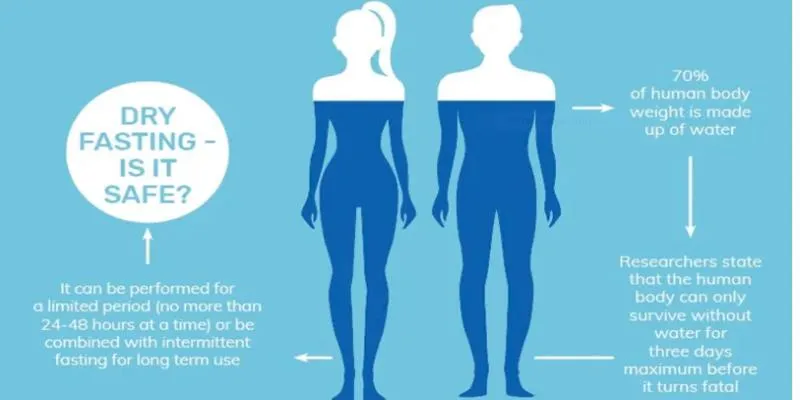Dry Fasting: Why You Should Avoid It? Key Reasons
Fasting has quickly gained popularity as a wellness method among people trying to lose weight. Various types of fasting are promoted on social media platforms for their myriad health benefits, one of the extreme forms being dry fasting. It is a stricter type of fasting in which people abstain from food and water to lose weight.
The question here is, is dry fasting safe? Why should you avoid it?
Dry fasting is unsafe, according to registered dietitian Julia Zumpano, RD, LD. This no-water and food trend increases your risk of dehydration and causes other potentially serious complications like electrolyte imbalance, kidney and liver damage, reduced metabolism and muscle loss, among others.
In this blog post, we will discuss dry fasting, its health risks, and why it should be avoided.

What Is Dry Fasting?
Dry fasting involves abstaining from food and all kinds of fluids, including water, tea, or soups, for an extended period. The idea is that the body meets its energy needs from toxins present in the body. There are two types of dry fasting:
- Soft Dry Fasting: In this condition, a person can brush, bathe, and wash their face.
- Hard Dry Fast: In this method, you abstain from eating and drinking water entirely. The body starts using food reserves to generate energy at the cellular level. This intense fasting puts your body under stress and starts autophagy, where the body recycles old and damaged cells to produce energy.
Some evidence reveals intermittent fasting has benefits like weight loss, improved immune system, brain health, and slowing aging, but dry fasting can be fatal. Not drinking water for extended periods may increase the risk of dehydration and other complications.

Dry Fasting Vs. Water Fasting
The key difference between dry fasting and water fasting is the intake of liquids. In water fasting, individuals restrict themselves from eating food but continue to drink water. Though water fasting is still a form of extreme fasting, it allows the body to stay hydrated, thus reducing the risks of other complications.
On the other hand, dry fasting is when you do not drink water or other beverages. During certain religious fasts, such as Ramadan, the holy Muslim month of fasting, or Jewish holidays, you may also need to restrict yourself from drinking water or other liquids.
Purported or Spiritual Benefits of Dry Fasting
Some studies suggest that people following Ramadan fasts can enjoy spiritual benefits, such as increased gratitude, deeper faith, improved awareness, and an opportunity for prayer. In addition, dry fasting is purported to assist in weight loss, immune boost, and cell regeneration while diminishing inflammation and slowing aging. However, Zumpano says there is insufficient data and research on dry fasting for the general public. The negative effects of dry fasting can lead to dehydration and other complications.
Other safer forms of fasting, like intermittent fasting, can improve metabolism, boost the immune system, promote heart and brain health, stimulate cellular repair, and reduce insulin resistance.
Why You Should Avoid Dry Fasting? Major Health Risks
Why is dry fasting unsafe?

Dry fasting is unsafe because if continued or repeated for a longer period, it may lead to severe health complications, including:
Dehydration
Dehydration is one of the major health risks of dry fasting. Your body continuously loses water from the lungs during breathing, the skin during sweating, and the kidneys during urine production. Kidneys may also stop producing urine if you stop consuming liquids; however, water loss from the other two continues. Lack of hydration consequences include dehydration and kidney damage, which increases the electrolyte imbalance risks and hypotension.
Urinary and Kidney Issues
Prolonged and repeated dry fasting can cause urinary tract infections (UTI) and kidney stones, reducing kidney function.
Dry Fasting and Nutrient Deficiency
Continuous dry fasting can lead to vitamin, mineral, and other nutrient deficiencies, resulting in weakness.
Eating Disorder
Extended dry fasting can make some individuals binge eat after fasting, which can put them at an increased risk of eating disorders.
Hypoglycemia
Abstaining from food and water for longer periods can drastically bring down your sugar levels, resulting in hypoglycemia, and you may also faint.
Dry Fasting and Muscle Loss
Fasting forces your body to use stored energy from the muscles and liver. When this energy source is used up, your body starts burning fats. If fasting continues longer, your body will also use proteins for energy. Then, you may face muscle loss or organ damage from dry fasting.
Dry Fasting Side Effects
Like all other fasting types, dry fasting also has some potential side effects, including:
- Hunger: Avoiding water and food intake may result in persistent hunger. Water keeps you satiated, and if you abstain from water, hunger risk may increase.
- Irritability: As the hunger pangs continue, you are more likely to feel cranky and disturbed, leading to irritability.
- Tiredness: You may be deprived of the required fuel for body functioning if you abstain from food and water for longer. That’s why you might feel fatigue and weakness during dry fasting.
- Headaches: Refraining from caffeine and other essential nutrients like carbohydrates and water can lead to headaches.
- Lowered Urine Output: When water is avoided, kidneys produce dark and smelly urine, thus decreasing the urine output, and you may feel dehydrated.
- Poor Focus: When the body faces nutrient deficiencies, you may feel tired and hungry, and it may cause you to lose your concentration from work.
Who Should Avoid Dry Fasting?
Is dry fasting safe for everyone? No, it is not safe for everyone. Some people with certain conditions should avoid dry fasting. These people include:
- Growing children and individuals under 18
- People with diabetes mellitus type 1
- People with eating disorders
Such individuals should avoid dry fasting to protect themselves from its negative effects.
Final Verdict
Fans claim that dry fasting can help people lose weight and provide other health benefits. But from a medical perspective, that’s not true. Withholding water and other liquids is not safe and can result in dehydration, urinary and kidney damage, nutrient deficiency, reduced metabolism, eating disorders, and muscle loss. Therefore, you should avoid dry fasting to prevent yourself from its side effects.